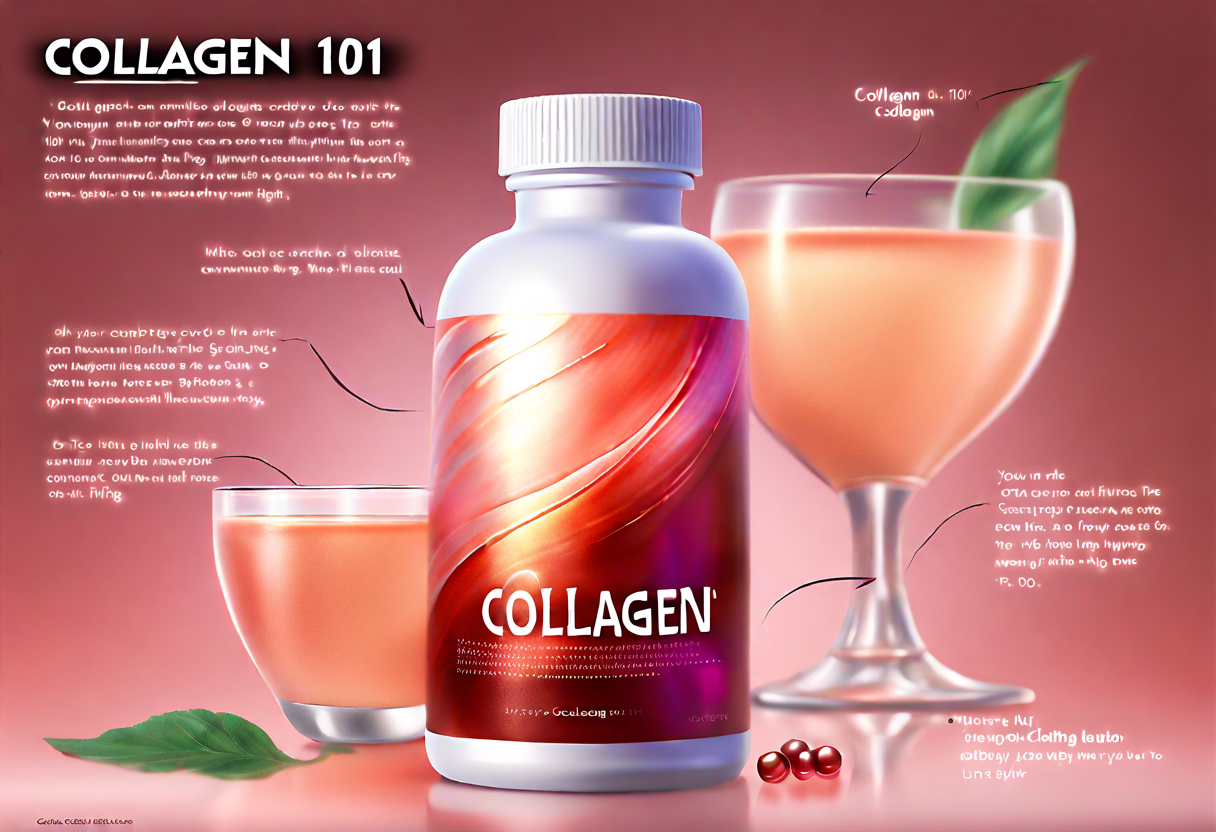Click Here if You Prefer to Listen to Quick Summary Content of the Blog Post about The Collagen 101
Collagen is a vital protein in the human body, serving as a building block for skin, bones, tendons, and ligaments. It plays a crucial role in maintaining youthful and radiant skin, as it provides structure, elasticity, and firmness.
As we age, collagen production naturally declines, leading to wrinkles, sagging skin, and joint stiffness. To combat these signs of aging, many individuals turn to collagen supplements to support their body’s collagen levels and promote a more youthful appearance.
One of the key factors in understanding the science behind collagen is recognizing the different types of collagen present in the body. There are at least 16 types of collagen, but the most common ones are Type I, II, and III.
Type I collagen is abundant in the skin, bones, and tendons, while Type II is found in cartilage, providing cushioning and support. Type III collagen contributes to skin elasticity and firmness. Each type plays a unique role in maintaining the body’s overall structural integrity and function.
Collagen supplements come in various forms, including powders, pills, and liquids. These supplements offer a convenient way to boost collagen levels in the body and promote skin health.
Type I collagen supplements are popular for improving skin elasticity and reducing wrinkles, while Type II collagen supplements are beneficial for joint health and mobility. Additionally, Type III collagen supplements can help enhance skin firmness and hydration.
When it comes to collagen production, our bodies naturally produce less collagen as we age. Factors such as sun exposure, smoking, and a poor diet can further accelerate this decline. However, there are ways to support collagen production naturally.
Consuming a diet rich in collagen-boosting foods such as bone broth, fish, fruits, and vegetables can help stimulate collagen synthesis in the body. Furthermore, incorporating a skincare routine that includes collagen-boosting ingredients like retinol and vitamin C can also promote healthy collagen levels in the skin.
Understanding the science behind collagen and its role in maintaining youthful skin is essential for anyone looking to preserve their skin’s firmness and elasticity.
By incorporating collagen supplements, collagen-boosting foods, and healthy lifestyle habits, individuals can support their body’s collagen production and promote a more youthful appearance.
Remember, taking care of your skin from the inside out is key to unlocking the benefits of this youthful elixir.
Different Types of Collagen Supplements and Their Benefits
When it comes to collagen supplements, it’s essential to understand that not all collagen is created equal. There are several types of collagen used in supplements, each offering specific benefits for your skin, joints, and overall health.
1. Type I Collagen: This type of collagen is the most abundant in the human body and is crucial for maintaining skin elasticity and firmness. Type I collagen supplements are known for their skin-rejuvenating properties, helping to reduce wrinkles and improve skin hydration.
2. Type II Collagen: Primarily found in cartilage, type II collagen supplements are beneficial for joint health. They can help reduce joint pain, increase mobility, and support overall joint function, making them ideal for individuals with arthritis or joint-related issues.
3. Type III Collagen: Often found alongside type I collagen, type III collagen is crucial for skin elasticity and firmness. Supplements containing type III collagen can further enhance skin texture and promote a youthful appearance.
4. Multi-Collagen Formulas: Some supplements combine multiple types of collagen to provide comprehensive benefits. These formulas typically include types I, II, and III collagen, offering a holistic approach to skin, joint, and bone health.
Choosing the right collagen supplement depends on your specific needs and health goals. For skin benefits, opt for type I and type III collagen supplements, while individuals focusing on joint health should consider type II collagen products. Multi-collagen formulas are ideal for overall health and comprehensive support.
Before incorporating collagen supplements into your routine, consult with a healthcare provider to determine the most suitable type and dosage for your needs.
By understanding the different types of collagen supplements and their benefits, you can make an informed decision to support your skin, joint, and overall health.
How Collagen Production Declines with Age and Ways to Boost It Naturally
Collagen, a crucial protein in the body, plays a vital role in maintaining skin elasticity, firmness, and overall youthful appearance. Unfortunately, as we age, collagen production naturally declines.
This reduction can lead to wrinkles, sagging skin, and joint pain. Factors such as sun exposure, smoking, and an unhealthy diet can further accelerate this process.
To counteract this decline, incorporating certain habits into your lifestyle can help boost collagen production naturally. One effective way is through proper nutrition.
Consuming a diet rich in vitamin C, zinc, copper, and proteins can provide the necessary building blocks for collagen synthesis. Foods like citrus fruits, bell peppers, nuts, seeds, lean meats, and fish can support this process.
Moreover, maintaining a healthy lifestyle by staying hydrated, getting enough sleep, and exercising regularly can also promote collagen production.
Adequate hydration is essential for skin elasticity, while quality sleep allows the body to repair and regenerate cells, including collagen-producing cells. Exercise improves blood circulation, delivering nutrients to the skin and supporting collagen synthesis.
Additionally, certain skincare products containing ingredients like retinoids, peptides, and antioxidants can help stimulate collagen production when applied topically. These products can enhance the skin’s firmness and reduce the appearance of fine lines and wrinkles.
Understanding how collagen production declines with age and implementing natural ways to boost it can help maintain youthful skin and overall health.
By adopting a holistic approach that includes proper nutrition, lifestyle habits, and skincare routine, you can support your body in producing collagen effectively as you age.

Collagen-Boosting Foods for Radiant Skin: Enhance Your Beauty from Within
When it comes to achieving glowing and youthful skin, incorporating collagen-boosting foods into your diet can work wonders.
These foods are rich in essential nutrients that support collagen production, helping to maintain skin elasticity and firmness naturally.
Including a variety of collagen-boosting foods in your meals can be a delicious and effective way to enhance your beauty from within.
1. Berries: Berries such as strawberries, blueberries, and blackberries are packed with antioxidants that help protect the skin from damage caused by free radicals. These fruits also contain vitamin C, which is essential for collagen synthesis.
2. Leafy Greens: Spinach, kale, and other leafy greens are excellent sources of vitamin C, vitamin A, and antioxidants that promote collagen production. Adding a generous portion of leafy greens to your meals can help keep your skin radiant and youthful.
3. Bone Broth: Rich in collagen and amino acids, bone broth is a fantastic food for supporting skin health. Consuming bone broth regularly can provide the building blocks necessary for collagen synthesis, helping to improve skin elasticity and hydration.
4. Fatty Fish: Salmon, mackerel, and sardines are excellent sources of omega-3 fatty acids, which help reduce inflammation and support skin health. Omega-3 fatty acids also help maintain the integrity of the skin’s cell membrane, promoting a soft and smooth complexion.
5. Citrus Fruits: Oranges, lemons, and grapefruits are high in vitamin C, a crucial nutrient for collagen production. Vitamin C helps protect the skin from oxidative stress and promotes collagen synthesis, keeping your skin looking youthful and vibrant.
6. Nuts and Seeds: Almonds, walnuts, chia seeds, and flaxseeds are rich in essential fatty acids, vitamins, and minerals that support skin health. These healthy fats help maintain skin moisture and elasticity, reducing the appearance of fine lines and wrinkles.
These collagen-boosting foods into your diet can make a significant difference in the overall health and appearance of your skin.
By nourishing your body with the right nutrients, you can support collagen production, fight signs of aging, and achieve a radiant complexion that glows from the inside out.
Start including these foods in your meals today and let your skin reap the benefits of a collagen-rich diet.
Potential Side Effects and Precautions When Using Collagen Supplements
Collagen supplements have gained popularity for their potential benefits in promoting skin elasticity, joint health, and overall well-being.
While these supplements are generally safe for most people, it’s essential to be aware of potential side effects and precautions before incorporating them into your daily routine.
One common side effect of collagen supplements is digestive issues. Some individuals may experience bloating, gastrointestinal discomfort, or diarrhea when taking these supplements.
To minimize these side effects, it’s recommended to start with a lower dose and gradually increase it as your body adjusts.
Another important consideration is the source of collagen in the supplements. Collagen derived from animals, such as bovine or marine sources, may not be suitable for individuals with specific dietary restrictions or allergies.
It’s crucial to read the product labels carefully and choose supplements that align with your dietary preferences and restrictions.
Individuals with medical conditions, such as kidney problems or autoimmune disorders, should consult with a healthcare provider before starting collagen supplementation.
Certain ingredients in collagen supplements may interact with medications or exacerbate existing health issues, making it essential to seek professional medical advice.
Furthermore, quality control is paramount when selecting collagen supplements. Opt for reputable brands that undergo third-party testing to ensure purity and safety. By choosing high-quality supplements, you can reduce the risk of potential contaminants or unwanted additives that may cause adverse reactions.
In addition to being mindful of potential side effects, it’s essential to follow the recommended dosage guidelines provided by the supplement manufacturer. Avoid exceeding the suggested daily intake, as high doses of collagen may lead to unforeseen complications or health risks.
While collagen supplements offer promising benefits for skin health and overall wellness, it’s crucial to approach their usage with caution.
By being informed about potential side effects, choosing high-quality products, and seeking medical advice when necessary, you can safely incorporate collagen supplements into your daily regimen and reap the rewards of this youthful elixir.

Conclusion
Collagen supplements or collagen-boosting foods into your routine can help enhance the health and appearance of your skin. While collagen production naturally decreases with age, there are ways to support and stimulate its synthesis through various means.
Understanding the science behind collagen and its importance in maintaining youthful skin provides insight into how collagen supplements work and the benefits they offer to overall skin health.
Different types of collagen supplements cater to specific needs, whether it be marine collagen for its superior absorption or collagen peptides for enhanced bioavailability. These supplements play a vital role in replenishing collagen levels and supporting skin elasticity and hydration.
Additionally, consuming collagen-boosting foods such as bone broth, berries, and leafy greens can further promote collagen production and skin rejuvenation from within.
As collagen production declines with age, it is crucial to explore natural ways to boost collagen synthesis. lifestyle habits like regular exercise, adequate sleep, and stress management can help maintain optimal collagen levels.
Moreover, certain nutrients like vitamin C, zinc, and copper are essential for collagen formation and can be obtained through a balanced diet or supplementation.
Including collagen-boosting foods in your everyday meals can significantly impact your skin health and contribute to a radiant complexion.
Foods rich in antioxidants, omega-3 fatty acids, and amino acids play a key role in supporting collagen synthesis and protecting the skin from damage caused by environmental factors.
By nourishing your body with nutrient-dense foods, you can promote collagen production and maintain youthful skin from the inside out.
While collagen supplements offer a convenient way to boost collagen levels, it is essential to be aware of potential side effects and take precautions when incorporating them into your regimen.
Some individuals may experience digestive issues or allergic reactions to certain types of collagen supplements.
It is advisable to consult with a healthcare provider before starting any new supplement and carefully follow dosage recommendations to minimize the risk of adverse effects.
Additionally, ensuring the quality and purity of the supplements you choose is imperative for achieving safe and effective results.
By understanding the science behind collagen, exploring different types of supplements, and adopting collagen-boosting practices, you can support your skin’s health and vitality as you age.
Collagen-rich foods and making lifestyle choices that promote collagen synthesis can help you maintain a youthful complexion and combat signs of aging effectively.
Remember to prioritize consistency and patience when integrating collagen-boosting strategies into your daily routine, as the benefits of nourishing your skin from within will reflect positively on its overall appearance and resilience.

